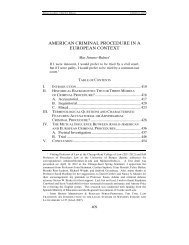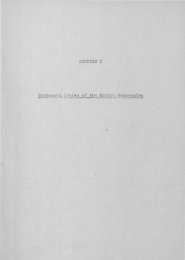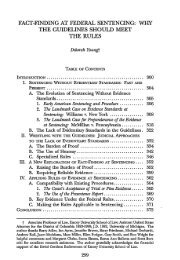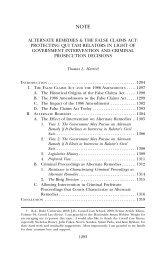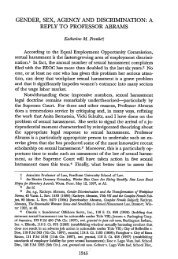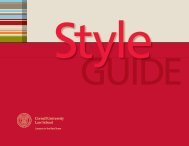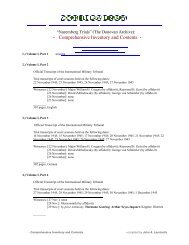JUDICIAL CLERKSHIP HANDBOOK - Cornell University Law School
JUDICIAL CLERKSHIP HANDBOOK - Cornell University Law School
JUDICIAL CLERKSHIP HANDBOOK - Cornell University Law School
You also want an ePaper? Increase the reach of your titles
YUMPU automatically turns print PDFs into web optimized ePapers that Google loves.
positions as Atemporary,” meaning that they are for a one‐ or two‐year duration, like<br />
Aelbow@ clerks. Other courts classify these positions as permanent. While most of these<br />
positions are available to recent law school graduates, a few of the jurisdictions require a<br />
few years practice experience. See Appendix D.<br />
FEDERAL ADMINISTRATIVE AGENCIES<br />
A number of positions are available in which attorneys act as clerks to Administrative <strong>Law</strong><br />
Judges (ALJs). Unlike federal judges who are appointed for life or specific terms, ALJs are<br />
U.S. Government employees. ALJs conduct formal administrative hearings and issue<br />
decisions based on trial‐type proceedings. Typically, appeals from these decisions are to<br />
the Federal Courts of Appeals. Working as an ALJ=s law clerk can be useful to your career,<br />
especially if you plan to practice in the particular area of law in which the agency<br />
specializes. Contact each agency for employment information. Hiring for these law clerk<br />
positions is not governed by the Federal Judges <strong>Law</strong> Clerk Hiring Plan. The best resource on<br />
this topic is an Excel spreadsheet compiled by NALP. You can find this on the Office of<br />
Public Service’s Resources page: http://www.lawschool.cornell.edu/publicservice/Public‐<br />
Service‐Career‐Planning‐Resources.cfm (username: cls\career‐web; password: office‐2k)<br />
Select “Judicial ‐ Federal Courts” and “Clerkships with Administrative <strong>Law</strong> Judges.”<br />
U.S. BANKRUPTCY COURTS<br />
Each federal district court has a bankruptcy court. The U.S. bankruptcy courts have<br />
jurisdiction over claims arising under the federal bankruptcy laws. The volume of cases and<br />
proceedings in bankruptcy court is generally greater than in other trial courts. <strong>Law</strong> clerks<br />
can expect to be involved in disputes involving the interface between bankruptcy law and<br />
most other areas of civil law, such as contract law, labor law and tax law. Most trials are<br />
bench trials.<br />
U.S. COURT OF FEDERAL CLAIMS<br />
The jurisdiction of the U.S. Court of Federal Claims extends to actions against the United<br />
States government. About one‐third of the cases involve tax refund suits, an area in which<br />
the Court exercises concurrent jurisdiction with the district courts. Because invoking the<br />
federal claims court=s jurisdiction is more difficult than that of the district court or of the tax<br />
court, the cases presented tend to involve the most complex and difficult issues in tax law.<br />
Another aspect of the court=s jurisdiction involves government contracts, among the fastest<br />
growing areas of federal law. Other areas of jurisdiction include inverse condemnation suits<br />
under the Fifth Amendment and claims by Indian tribes for unfair dealing by the U.S.<br />
government. Anecdotal information from people familiar with the Court of Federal Claims=<br />
hiring practices tells us that it is beneficial to have one letter of recommendation from an<br />
attorney who appears before this court. In addition, the court is more likely to interview<br />
candidates from local (Washington, D.C.‐ area) schools, so it makes sense to indicate in your<br />
cover letter that you plan to travel to Washington, D.C., and then follow up with a phone<br />
call to emphasize your interest.<br />
5 | P age




